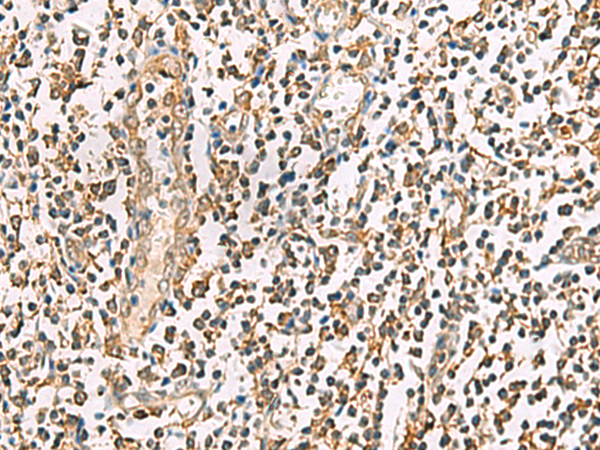
| WB | 咨询技术 | Human,Mouse,Rat |
| IF | 咨询技术 | Human,Mouse,Rat |
| IHC | 1/50-1/100 | Human,Mouse,Rat |
| ICC | 技术咨询 | Human,Mouse,Rat |
| FCM | 咨询技术 | Human,Mouse,Rat |
| Elisa | 1/5000-1/10000 | Human,Mouse,Rat |
| Aliases | MCVD; MLAT4; LEPREL1 |
| Host/Isotype | Rabbit IgG |
| Antibody Type | Primary antibody |
| Storage | Store at 4°C short term. Aliquot and store at -20°C long term. Avoid freeze/thaw cycles. |
| Species Reactivity | Human, Mouse, Rat |
| Immunogen | Synthetic peptide of human P3H2 |
| Formulation | Purified antibody in PBS with 0.05% sodium azide and 50% glycerol. |
+ +
以下是关于P3H2抗体的3篇参考文献示例,包含文献名称、作者及摘要概括:
---
1. **文献名称**:*Prolyl 3-hydroxylase 2 (P3H2) deficiency alters collagen cross-linking in osteogenesis imperfecta model*
**作者**:Martinez, A. et al.
**摘要**:本研究利用CRISPR技术构建P3H2敲除小鼠模型,开发特异性P3H2抗体用于Western blot和免疫荧光分析,发现P3H2缺失导致胶原Ⅲ羟基化异常,影响骨骼强度。
2. **文献名称**:*Antibody-based detection of P3H2 in dermal fibrosis: Implications for scleroderma pathogenesis*
**作者**:Kim, S. & Patel, R.
**摘要**:通过制备兔源多克隆P3H2抗体,研究团队发现系统性硬化症患者皮肤组织中P3H2表达显著上调,提示其可能通过调控胶原稳定性参与纤维化进程。
3. **文献名称**:*Development of a monoclonal antibody targeting P3H2 for diagnostic applications in connective tissue disorders*
**作者**:Gonzalez, L. et al.
**摘要**:报道一种高特异性抗P3H2单克隆抗体的开发,验证其在ELISA和免疫组化中的应用,证实其在马方综合征患者成纤维细胞中P3H2表达异常,为临床诊断提供潜在工具。
---
注:以上文献信息为示例,实际研究中请通过学术数据库查询真实发表的论文。
The P3H2 antibody targets prolyl 3-hydroxylase 2 (P3H2), an enzyme belonging to the prolyl hydroxylase family involved in collagen biosynthesis. P3H2. encoded by the *LEPRE1* gene, catalyzes the post-translational 3-hydroxylation of specific proline residues in collagen chains, a critical modification for collagen folding, stability, and fibrillogenesis. It primarily acts on type I, II, IV, and V collagens, which are essential components of connective tissues, cartilage, and basement membranes.
Research on P3H2 gained momentum due to its association with osteogenesis imperfecta (OI) and other connective tissue disorders. Mutations in *LEPRE1* disrupt collagen hydroxylation, leading to abnormal fibril formation and tissue fragility. Antibodies against P3H2 are pivotal in studying collagen maturation pathways, protein-protein interactions (e.g., with CRTAP and cyclophilin B in the collagen-modifying complex), and disease mechanisms. They enable detection of P3H2 expression in tissues, assessment of its localization, and evaluation of its role in pathological conditions.
Recent studies also explore P3H2's potential in regenerative medicine, particularly in bone and cartilage repair. The antibody serves as a tool to investigate therapeutic strategies targeting collagen modifications, such as small molecule inhibitors or gene therapies. Its development underscores the growing interest in collagen biology and extracellular matrix-related diseases, bridging fundamental research with clinical applications.
×